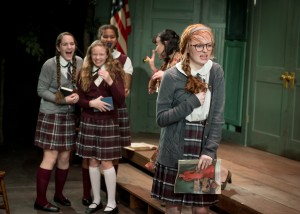 There are times when the truth matters less than what shocks people — what plays into their fears and suspicions and spurs them on to outrage. This is particularly clear as of late in our Oxford Dictionary-declared post-truth era. A play about a compulsive liar who remorselessly ruins lives by playing on people’s paranoia is more than a little bit apropos given the current climate; in fact, it feels like a prime example of life imitating art.
There are times when the truth matters less than what shocks people — what plays into their fears and suspicions and spurs them on to outrage. This is particularly clear as of late in our Oxford Dictionary-declared post-truth era. A play about a compulsive liar who remorselessly ruins lives by playing on people’s paranoia is more than a little bit apropos given the current climate; in fact, it feels like a prime example of life imitating art.
Such is the context in which the Sandra Feinstein-Gamm Theatre’s production of Lillian Hellman’s The Children’s Hour finds itself. Directed by Rachel Walshe, this production meshes the world of the 1930s in which the play was written with the modern day. This is made clear by the music chosen and the production poster, which features a black and white photo of the younger performers all in modern clothing and holding cell phones and tablets. Though the specifics of the play are particular to the ’30s, the underlying principles are timeless. More to this point, the events from which the play is based occurred in 1809 at a boarding school in Scotland.
Like the actual events, the bulk of the play occurs at an all-girls boarding school. The school is run by close friends Karen Wright (Madeleine Lambert) and Martha Dobie (Karen Carpenter). Though all is — for the most part — going well with the school, there are two glaring problems interfering with its success. The first is Lily Mortar (Casey Seymour Kim), Martha’s eccentric and aloof aunt who has overstayed her welcome. As Martha attempts to persuade Aunt Lily to leave, Aunt Lily suggests that Martha is “unnaturally” jealous of Karen’s relationship with Dr. Joseph Cardin (Benjamin Grills) and that she needs a beau of her own. Unfortunately, two students overhear this conversation and report it to their roommate, the second problem, Mary Tilford (Grace Viveiros). Mary is the spoiled granddaughter of Mrs. Amelia Tilford (Wendy Overly), a benefactor of the school. She is disobedient and a compulsive liar who feels that she is being mistreated. When she runs away to her grandmother’s house, in an effort to remain home and not have to go back to school, she twists the story she has heard from her roommates to make it sound like the headmistresses have been having an affair. The lie takes root, as her classmates are pulled out of the school, and the accused sue for libel in a case they ultimately lose.
As you might expect, The Children’s Hour initially scandalized audiences. The Pulitzer Prize committee refused to consider it for Best Drama, and some cities banned productions of the play, including Boston. More recently, however, it has received a resurgence, as its message about the power of lies and prejudice remains all too relevant.
The cast features a mix of Gamm regulars, including Overly, Kim and Carpenter and newcomers, including high school students from around the state recruited to play the students. Viveiros’ Mary makes the girls from “Mean Girls” look like perfect angels. Few fictional characters have managed to achieve such a level of unapologetic and irredeemable evil. Even those who are the first to look for the good in the bad guys will struggle to find anything sympathetic in Mary. Though it’s hard to say any performance of such a sadistic character is enjoyable, what is lovely is her singing voice, which the audience is briefly treated to at the climax of Mary’s evil plot.
Perhaps the best performances of the cast come in the second act, during the fallout of the events of the first act. Tensions are high, and Martha and Karen have accepted defeat. There is an emptiness in even the most emotional moments that can only come from the deep depression that results from losing everything, and this serves to enhance the tragedy of the situation in a way that doesn’t make it over the top. It is particularly heart-wrenching to watch Lambert’s Karen go from a kindhearted teacher who genuinely cares about her students to an empty shell who has lost the ability to trust anyone.
The Children’s Hour shows us how our fears and prejudices can control what we believe. With our constant connection to social media today, we are constantly bombarded by information, some true, some not. The internet does not value what is true over what is an hysteria-driven story. We are left to make that distinction, but as we come in with our preconceptions, this is often easier said than done. It would be interesting to see a modern-day version of the play in which social media is the catalyst through which the lie grows to life-ruining proportions. While the means through which slanderous rumors spread has changed, the consequences remain as disastrous as ever.
The Children’s Hour runs at The Sandra Feinstein-Gamm Theatre, 172 Exchange St, Pawtucket through Feb 12. For tickets, visit gammtheatre.org or call the box office at 401-723-4266.




